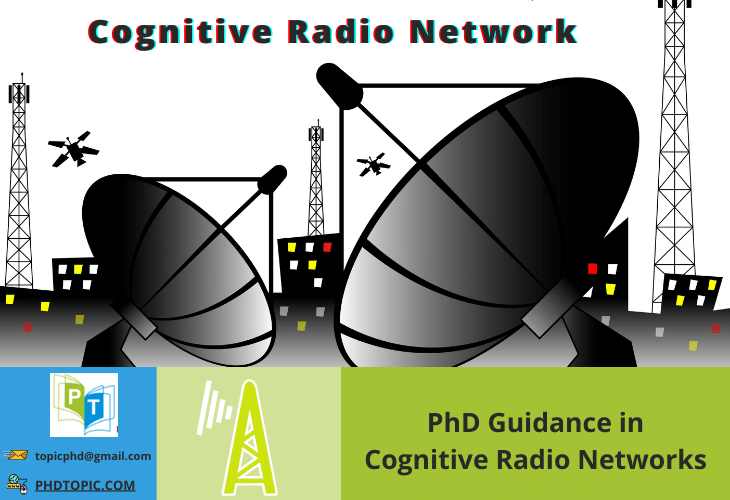PhD Guidance in Cognitive Radio Networks
PhD Guidance in Cognitive Radio Networks is carryout research in upcoming research areas in cognitive radio networks.. The main reason behind this deep research is to serve our students to get their PhD on time. We offer a number of opportunities to highly motivate our scholars and commit to working with us. We continuously keep on active collaboration with the scholars in a number of current technologies. This will helpful for our scholar’s research to reach the pinnacle of success. Now, let see our basic definition of cognitive radio networks.
–“Cognitive Radio Networks is a new-fangled approach for wireless communication which optimizes radio resources and provisioning QoS”. Current cognitive radio networks concentrate on spectrum sensing, information theory, link adaptation, frequency sharing for 5G, cooperative spectrum sensing, constraint learning, channel inference, and access delay reduction, and advanced transceiver design.
We employed 200+ research experts to start with the domain suggestion to the final viva voce preparation. Our ideal experts have the knowledge and experience in a number of following areas of cognitive radio networks.
 Recent Trends in Cognitive Radio Networks
Recent Trends in Cognitive Radio Networks
- CRN oriented standards
- Dynamic spectrum access for 5G in CRN
- Massive IoT Deployment
- Digital inclusion in the 5G era
- Decentralized spectrum access
- Spectrum sharing for CRN communication
- New opportunities of dynamic spectrum management
Guidance in Cognitive Radio Networks
PhD Guidance in Cognitive Radio Networks is rapidly expanding research platform rendered by us. This area is seeking by various research scholars who wish to contribute to their research projects. The main research area on CRN is Machine learning, which incorporates other research areas, including optimization and control theory, mathematical tools (statistics) and hybrid algorithms, etc. Our guidance starts from the basic definition to the end of new technology development.
Research paper and thesis are your final output for PhD. We ready to work for both as we are currently writing 200+ research papers for worldwide research scholars. Our special support for students is paper publication since we membered in 600+ top international journals (IEEE, Springer, ACM, EURASIP, ScienceDirect, Elsevier, etc.). This will helpful for our students to publish their papers in highly international journals. After our completion of guidance, you become a technology leader by our technology followers.
For your successful research, join you today with our strong and motivated research team
Advanced Research Topics in Cognitive Radio Networks
- Routing and handoff protocols
- Dynamic spectrum sharing
- Multi user access also for cognitive radio
- Spectrum sensing and also measurements
- Statistical modeling of spectrum usage
- Waveform design and modulation also for CRN
- Interference aggregation also in CRN
- Distributed cooperative spectrum sensing
- Machine learning techniques also for CRN systems
- Issues on self-configuration and also interoperability
- Distributed optimization and also adaptation methods
- Resource allocation also using multi-antennas
- Energy efficient communication and also networking
- Database implementation in cognitive radio networks
- Coordinated and also cooperative communications
- Spectrum sharing economic aspects also in CRN
- Security and also privacy of cognitive spectrum agile networks
- Regulatory policies and also interactions with networking
- Attack mitigation and also prevention in cognitive radio
- Physical layer secrecy also in cognitive networks
- Modeling and also performance evaluation of CRN
- QoS provisioning also in cognitive radio
- IoT: spectrum sharing and also sensing
- Mm-wave: spectrum sharing and also sharing
- Services and also applications in CRN
- CRN testbeds, standards, hardware prototypes and also simulation tools
Development Tools and Software’s
- OPNET
- CRCT
- NetSim
- CogNS
- MATLAB
- CrSimulator
- OMNET++/MiXiM
- CRCN
- CRE-NS3
- SEAMCAT
- MCRNSim
Purpose of Tools and Software’s
- OPNET: OPNET modeler wireless suite provides high performance in modeling and also simulation.
- CRTS: Flexible framework also to evaluate cognitive radio networks
- NetSim: Network simulation and simulation tool also for designing cognitive radio networks
- CogNS: Cognitive radio networks simulation framework also based on NS2 simulator
- MATLAB: 4th generation programming language that also used to simulate a centralized cognitive radio network.
- CrSimulator: OMNET++ based simulator used also for spectrum sharing in cognitive radio networks
- OMNET++/MiXiM: Cognitive radio simulation platform also to support DCF medium access policy with IEEE802.11b.
- CRCN: Software based network simulator also for cognitive radio cognitive network level simulations.
- CRE-NS3: Extension of NS3 simulator we call also this extension module for cognitive radio.
- SEAMCAT: Open source freely available software tool which is used to evaluate interference potential also for different radio communication technologies.
- MCRNSim: Mobile cognitive radio network simulator compatible also with .net 4.0 written in C# for simulating cognitive radio networks.
Major Research Topics in Cognitive Radio Networks
- Spectrum sensing algorithms
- Spectrum policy system model and also alternatives
- DSA technology and also algorithms
- VANETs in CRN
- Decision making also in CRN
- CRN architecture design
- Security also in CRN
- Sensing and geolocation
- Cross layers and also learning process
- Lower priority flows offloading
- Bandwidth congestion and also scarcity
- Routing protocols construction
- Internet and also cognitive networks
- Dynamic and also mobility network topology
- Cooperative wireless communications
- Algorithms also for adaptation and resource management
- Machine learning also for 5G cognitive radio networks
- Energy detection also in full duplex cognitive radio networks
- Opportunistic Spectrum Sensing also for multiuser cognitive radio
- Eigen value also based spectrum sensing in CRN.
